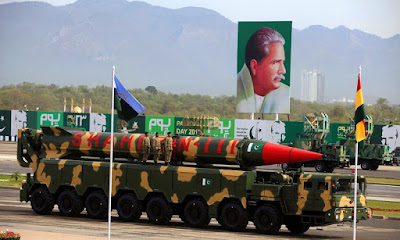Tensions between New Delhi and Islamabad are hitting a boiling point as the two point fingers at each other over Sunday's assault in Kashmir. But even as rhetoric gets heated, military escalation isn't expected—for now.
Four gunmen stormed an Indian army brigade headquarters in the Indian-administered town of Uri, killing 18 soldiers on Sunday. Many called it the deadliest attack on security forces in nearly a decade. Nobody has claimed responsibility but Prime Minister Narendra Modi'sgovernment accused Pakistan of involvement, labeling it a terrorist state for supporting militants believed to be the perpetrators of Sunday's attack.
India claims the gunman were members of Jaish-e-Mohammed (JeM), a terror group based in Pakistan and known for brutal tactics in India-controlled Kashmir to force the withdrawal of troops.
Islamabad has categorically rejected the allegations, describing the charges as New Delhi's attempt to deflect attention from the deteriorating human rights situation in Indian-controlled Kashmir.
Four gunmen stormed an Indian army brigade headquarters in the Indian-administered town of Uri, killing 18 soldiers on Sunday. Many called it the deadliest attack on security forces in nearly a decade. Nobody has claimed responsibility but Prime Minister Narendra Modi'sgovernment accused Pakistan of involvement, labeling it a terrorist state for supporting militants believed to be the perpetrators of Sunday's attack.
India claims the gunman were members of Jaish-e-Mohammed (JeM), a terror group based in Pakistan and known for brutal tactics in India-controlled Kashmir to force the withdrawal of troops.
Islamabad has categorically rejected the allegations, describing the charges as New Delhi's attempt to deflect attention from the deteriorating human rights situation in Indian-controlled Kashmir.
Retaliation would be a setback to Modi's attempts at normalizing relations with Pakistan, cautioned Dhruva Jaishankar, foreign policy fellow at Brookings Institution India. If Modi chooses to stay calm, he has the ability to withstand public pressure, Jaishankar added.
Domestic politics is another reason why New Delhi may wish to abstain from an armed conflict.
"Continued unrest in Kashmir could also bring down the state government, an uneasy coalition between a local party and the nationally ruling Bharatiya Janata Party (BJP), setting back the party's efforts to reach out to India's minority Muslim community ahead of upcoming state elections," Eurasia warned in a recent note.
The BJP's opposition could also exploit the current crisis to disrupt the winter session of parliament, which opens in November, and potentially delay legislation necessary to implement the long-awaited goods and services tax, Eurasia added.
For Kashmiris however, Sunday's attack is yet another obstacle towards peace.
"Who has benefited from this? Surely not Kashmiris," remarked Farooq Siddiqi, head of the World Kashmir Diaspora Alliance, a Canadian-based non-profit with chapters in Brussels and the U.S.
Pakistan-India tensions mount after attack in Kashmir 2016
 Reviewed by Umair Shahzad
on
September 23, 2016
Rating:
Reviewed by Umair Shahzad
on
September 23, 2016
Rating:
 Reviewed by Umair Shahzad
on
September 23, 2016
Rating:
Reviewed by Umair Shahzad
on
September 23, 2016
Rating:







No comments: